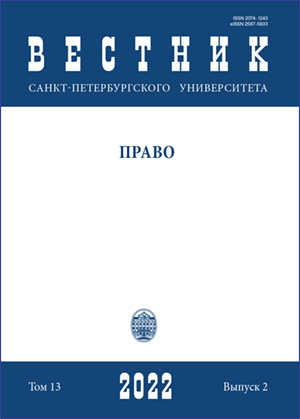Mass claims in international investment arbitration
DOI:
https://doi.org/10.21638/spbu14.2022.207Abstract
Following the economic crisis in Argentina international investment tribunals faced a new challenge: mass claims characterized with multiple claimants bringing the significant amount of homogeneous investment protection claims against the host state. Neither the 1965 Convention on the Settlement of Investment Disputes Between States and Nationals of Other States, nor applicable bilateral investment treaties cover the tribunals’ power to resolve mass claims. They are silent on crucial questions of jurisdiction and consent and do not address important procedural issues either. In these circumstances arbitral tribunals face the inevitablegap-filling process, which boils down to the critically important question of legal nature of mass claims. If mass claims are nothing more than a mere variety of “ordinary” claims, than the issues of special or “secondary” consent are irrelevant, since the general consent for arbitration will suffice for the tribunal to find itself competent to resolve the dispute. By contrast, if mass claims are different in their legal nature from “ordinary” bi- or multiparty arbitration, they cannot “fit” into the scope of parties’ general consent. In controversial Abaclat decision the majority ruled that the questions of tribunal’s powers to decide on mass claim brought by Italian investors against Argentina pertain to the sphere of admissibility rather than jurisdiction. This analysis was not accepted by dissenting arbitrator G. Abi-Saab. Interestingly, other multi-party “Argentinian” awards followed the line of argument which significantly differed from both the majority opinion in Abaclat and G. Abi-Saab’s dissent. This only highlights the controversial nature of mass claims in international investment arbitration. This article is dedicated to analysis of jurisdictional issues raised in the course of “Argentinian” arbitrations. Since this analysis is strongly intertwined with two other systems of resolution of mass claims, namely American class arbitration and public international law mechanisms dealing with the compensations for states’ international wrongdoings, these two mechanisms are also explored to provide better context and understanding.
Keywords:
international investment arbitration, mass claims, class action, collective remedies, jurisdiction of tribunal, collective claims, international disputes
Downloads
References
Downloads
Published
How to Cite
Issue
Section
License
Articles of "Vestnik of Saint Petersburg University. Law" are open access distributed under the terms of the License Agreement with Saint Petersburg State University, which permits to the authors unrestricted distribution and self-archiving free of charge.






